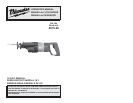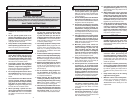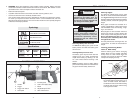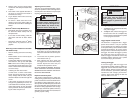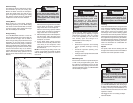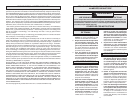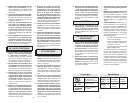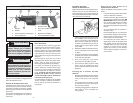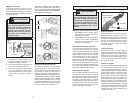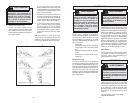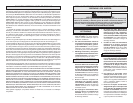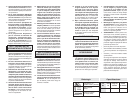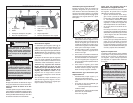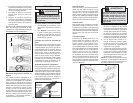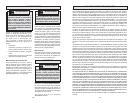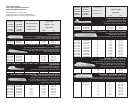
8 9
Plunge Cutting
Your MILWAUKEE Sawzall
®
is ideal for
plunge cutting directly into surfaces that can
not be cut from an edge, such as walls or
fl oors. Plunge cutting may be done two ways
depending on how the blade is inserted.
Column A shows how to plunge cut with the
teeth of the blade facing downward. (When
attempting to plunge cut in this manner, shoe
must be moved all the way out, as shown.)
Column B shows how to plunge cut with the
teeth of the blade facing upward. Do not
plunge cut into metal surfaces (see "Cutting
Metals").
1. Insert the blade into the tool.
With the teeth facing downward, hold the
tool as shown in Column A, resting the
edge of the shoe on the workpiece.
With the teeth facing upward, hold the
tool as shown in Column B, resting the
edge of the shoe on the workpiece.
2. With the blade just above the workpiece,
pull the trigger. Using the edge of the
shoe as a pivot, lower the blade into the
workpiece, as shown.
3. As the blade starts cutting, raise the
handle of the tool slowly until the shoe
rests firmly on the workpiece. Then
guide the tool along the cutting line for
the desired cut.
NOTE: To make plunge cutting easier, use
a heavy gauge blade and install the blade
with the teeth facing upward as shown in
Column B.
WARNING
To reduce the risk of explosion,
electric shock and property dam-
age, always check the work area for
hidden gas pipes, electrical wires
or water pipes when making blind
or plunge cuts.
Fig. 5
BA
General Cutting
For straight or contour cutting from an edge,
line the blade up with your cutting line.
Before the blade contacts the workpiece,
grasp the handle fi rmly and pull the trig-
ger. Then guide the tool along your cutting
line. Always hold the shoe fl at against the
workpiece to avoid excessive vibration.
Cutting Metals
Begin cutting at a slow speed, gradually
increasing speed as you cut. When cutting
into metals or hard materials that can not be
cut from an edge, drill a starting hole larger
than the widest part of the blade.
See Pages 30 & 31
for a listing of Super
Sawzall
®
Blades.
Cleaning
Clean dust and debris from charger and tool
vents. Keep tool handles clean, dry and free
of oil or grease. Use only mild soap and a
damp cloth to clean the tool, battery pack
and charger since certain cleaning agents
and solvents are harmful to plastics and other
insulated parts. Some of these include gaso-
line, turpentine, lacquer thinner, paint thinner,
chlorinated cleaning solvents, ammonia and
household detergents containing ammonia.
Never use fl ammable or combustible sol-
vents around tools.
Repairs
For repairs, return the tool, battery pack and
charger to the nearest service center listed on
the back cover of this operator's manual.
WARNING
To reduce the risk of injury,
always unplug the charger and
remove the battery pack from
the charger or tool before
performing any maintenance.
Never disassemble the tool,
battery pack or charger. Contact a
MILWAUKEE service facility for ALL
repairs.
Keep your tool, battery pack and char-
ger in good repair by adopting a regular
maintenance program. After six months
to one year, depending on use, return the
tool, battery pack and charger to a
MILWAUKEE service facility for:
• Lubrication
• Mechanical inspection and cleaning
(gears, spindles, bearings, housing,
etc.)
• Electrical inspection (battery pack,
charger, motor)
• Testing to assure proper mechanical and
electrical operation
Maintaining Tool
If the tool does not start or operate at full pow-
er with a fully charged battery pack, clean
the contacts on the battery pack. If the tool
still does not work properly, return the tool,
charger and battery pack, to a MILWAUKEE
service facility for repairs.
MAINTENANCE
WARNING
To reduce the risk of personal injury
and damage, never immerse your
tool, battery pack or charger in liquid
or allow a liquid to fl ow inside them.
ACCESSORIES
Always remove battery pack before
changing or removing accessories.
Only use accessories specifi cally
recommended for this tool. Others
may be hazardous.
WARNING
For a complete listing of accessories refer to
your MILWAUKEE Electric Tool catalog or go
on-line to www.milwaukeetool.com. To obtain
a catalog, contact your local distributor or a
service center listed on the back cover of this
operator’s manual.



